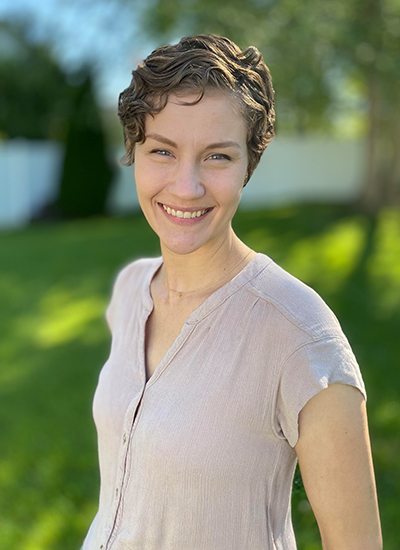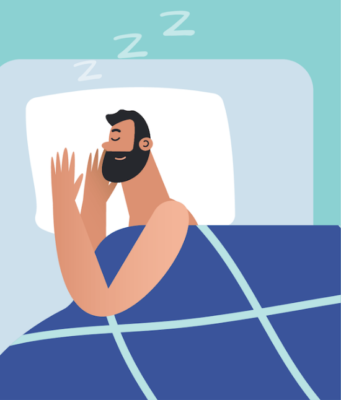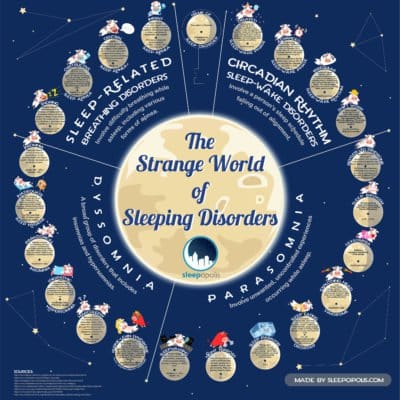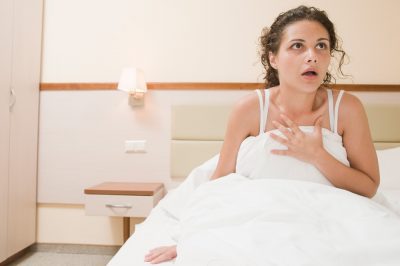Kleine-Levin Syndrome (Sleeping Beauty Syndrome)
- by Abby McCoy
- Published: December 13, 2023
Table of Contents
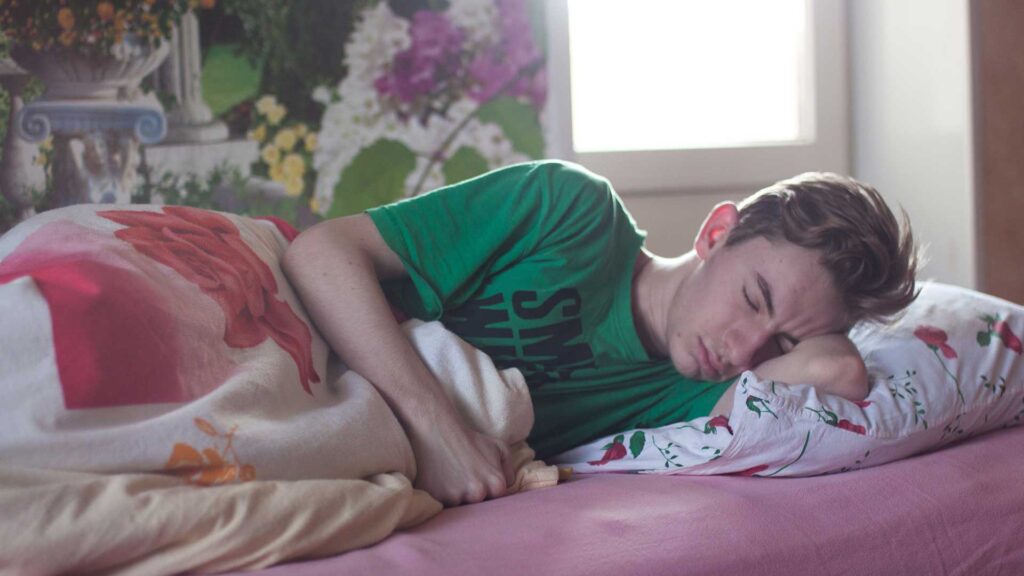
The notion of deep, enchanted sleep has long been romanticized in stories and myths such as Sleeping Beauty and Rip Van Winkle. But for patients diagnosed with Kleine-Levin Syndrome — also known as sleeping beauty syndrome — sleep doesn’t feel like a fairy tale. Fortunately, there are options for those with this syndrome: Between nonprofits that exist to help you live with this sleep syndrome and medical treatments to lessen your symptoms, here’s what to expect and what you can do to improve your sleep.
Long Story Short
- Kleine-Levin syndrome, also known as Sleeping Beauty syndrome or KLS, is a rare disorder affecting up to five people per million in the world.
- During episodes of KLS, people can sleep more than 20 hours per day and display out-of-character behaviors like mood changes and hypersexuality.
- KLS has no cure, but symptoms can be treated by medications, and research is being done to find better treatments.
What is Kleine-Levin Syndrome?
Kleine-Levin Syndrome (KLS) is a rare sleep disorder that causes repeating periods of excessive sleep (hypersomnia). In addition, while awake, people with KLS can act out with atypical behavior and have difficulty with brain functioning. (1)
Kleine-Levin syndrome is a cyclical condition, meaning episodes can repeat after weeks or months of normal behavior and sleep. Episodes build quickly, usually peaking in the first 24 hours, and (2) typically the affected person experiences symptoms for a few days to several weeks, Dr. Carolyn M. D’Ambrosio, MD, vice chief of fellowship training and mentorship for pulmonary, critical care, and sleep medicine at Yale University School of Medicine tells Sleepopolis.
“KLS is very rare,” says D’Ambrosio. It is so rare, in fact, that it affects only one to five people per million. (3) In fact, Typically, men are more likely to have KLS than women — approximately 70 to 75 percent of people with KLS are male, and the condition usually starts during adolescence. As those with KLS get older, episodes become less frequent and usually disappear completely. Sometimes, though, episodes can pop up later in life, too. (4)
During KLS events, you can sleep for 20 hours or more each day, waking only to eat and use the toilet. (5) This symptom prompted the nickname “Sleeping Beauty Syndrome.” (3) While awake and experiencing a KLS event, people with this particular sleep disorder may behave very differently than their normal selves. They can appear “spaced out” or in a trance and can also experience confusion, disorientation, hallucinations, lethargy, and a lack of emotional awareness. (2)
After an episode, people often have little to no recollection of events. But in between episodes, most people tend to snap back to their normal selves: alert, appropriate, and able to attend work and school activities. (2)
What Causes KLS?
Very little is known about what causes Kleine-Levin Syndrome, but experts think it could stem from a malfunction of the hypothalamus — a region of the brain that controls sleep, appetite, and body temperature. (2)
Some have reported flu-like symptoms at the onset of an episode, so experts suggest that viral and autoimmunity could be triggers. The circumstances of your birth may also come into play: In one small case series, 25 percent of KLS patients had complications during their birth such as prolonged labor, low oxygen supply, prematurity, or delayed birth. (2)
In the same series, people with KLS also had a higher incidence of genetic disorders like Klinefelter’s syndrome and von Willebrand syndrome, leading some experts to think they may be connected. (2)
Kleine-Levin Syndrome Symptoms
While a little extra sleep may not sound so bad, Kleine-Levin syndrome can cause an absolute avalanche of sleep to upend your life, getting in the way of other important life events and responsibilities. Plus it can come with other symptoms, many of which stem from feeling sleepy and problems with the hypothalamus. (2)
Excessive Sleeping
Likely not surprising to any fans of the classic Disney movie, sleeping beauty syndrome makes you sleep for long periods of time. As the nickname suggests, excessive sleeping is the number one clinical symptom of KLS. During an episode, someone with KLS may feel overwhelmingly lethargic and get irritable and even aggressive if woken up. (3)
Cognitive Impairment
An episode of KLS can impact the way your brain operates, too – it usually comes with multiple cognitive disturbances, like confusion, and problems with memory and concentration. In two-thirds of cases, an episode can include problems with speech, like being unable to speak at all, having slurred speech, or using language that is muddled, incoherent, or childish. (3)
Mood Changes
In addition to its other symptoms, KLS episodes can have quite the impact on your emotional state. About half of those with the condition report having feelings of depression and about 15 percent say they think about suicide. (3)
Unsurprisingly given the breakdown in the general population (6), depression associated with KLS is more common in women. (3) Anxiety and irritability can also be typical symptoms. (2)
Altered Perception
People with KLS often describe feeling “spaced out” or as though they are “in a dream world.” Some patients have visual or auditory hallucinations and delusions: They hear voices, see things that aren’t there. During a KLS episode, they may also perceive sensations differently, like feeling more hot or cold than normal. (2)
Hyperphagia (compulsive eating)
Another common symptom is excessive appetite and/or compulsive eating, which may also be called hyperphagia, megaphagia, or polyphagia. Often, patients will have cravings for and binge on unhealthy junk foods, snacks, and sweets that they would not usually eat. (2)
Hypersexuality
Some people (usually males) experience an increase in their sexual symptoms during a Kleine-Levin episode. These behaviors include an increased sexual drive, sexual comments, inappropriate sexual behaviors, and frequent masturbation. (2).
Diagnosis and Treatment
Diagnosing Kleine-Levin syndrome can be tricky. Often, patients get misdiagnosed with a psychiatric disorder because of similar symptoms like excessive sleepiness, overeating, and emotional withdrawal. (3)
A correct diagnosis is a process of elimination, and requires patience and dedication on behalf of the medical professionals involved. “First, other more common causes of hypersomnia need to be excluded, such as bipolar [disorder], medications, other sleep disorders,” says D’Ambrosio. “Then the patient must have one of the following during the bouts of hypersomnia: cognitive dysfunction, altered perception, eating dysfunction, disinhibited behavior.”
Once your healthcare provider has ruled out any other possibilities, they may order some tests to see if the condition truly is KLS, which may include: (3)
- Brain imaging: A computed tomography (CT) scan or a magnetic resonance imaging (MRI) scan can sometimes show changes in the brain that point to KLS.
- Electric Encephalogram (EEG): During this test, an examiner sticks electrodes to your scalp and measures your brain waves. KLS can cause a slowdown of some of these waves.
- Sleep study (polysomnography): A plain-old sleep study can tell your provider how long you’re sleeping and what you do while snoozing.
There is no standardized course of treatment for KLS, and results may vary significantly from person to person. Some specialists may recommend certain medications for patients to alleviate symptoms during extreme episodes. These include: (3)
- Lithium: acts as a mood stabilizer and is commonly given to patients with bipolar disorder.
- Risperdone and gabapentin: can help get sleep cycles back on track and lessen some psychotic symptoms.
- Stimulant drugs: may be prescribed to combat sleepiness, although these do not alleviate any of the other cognitive and behavioral disorders that occur during KLS episodes.
How to Help Someone with Kleine-Levin Syndrome
During episodes of excessive sleeping and out-of-character behavior, you can help your loved one by helping them stay safe and comforting them as needed. You can leave them alone to sleep but check on them regularly to make sure they are eating (but not excessively) and drinking, as well as using the bathroom. Don’t let them out on the town by themselves and if you need to take them anywhere, they shouldn’t drive.
This rare syndrome can feel isolating and scary, but you’re not alone. You and your loved one can choose from various online support groups for advice and empathy:
- KLS Foundation
- National Heart, Lung, and Blood Institute (NHLBI)
- National Organization for Rare Disorders (NORD)
People with KLS can also participate in clinical trials to help researchers discover new diagnostic methods, treatments, and maybe even a cure one day. You can find clinical trials near you at clinicaltrials.gov.
FAQs
Can you wake up a person with sleeping beauty syndrome?
“Not easily,” says Ambrosio, “and they fall right back asleep.” During a KLS episode, people can become irritable and even aggressive if woken up, so it can be best to let them sleep. (3)
How long do you sleep with sleeping beauty syndrome?
During episodes, patients may sleep for 20 hours or more each day, waking only to eat and use the toilet. Sleeping beauty syndrome is a cyclical condition; typically the affected person experiences symptoms for a few days to several weeks and episodes can repeat after weeks or months of normal behavior and sleep. (2)
The Last Word From Sleepopolis
Klein-Levin syndrome may sound like a lot, and it is, but it is extremely rare. If you have some of the symptoms we’ve discussed and think you may have KLS, the best thing to do is reach out to your healthcare provider. They can begin eliminating any other possible causes and help you get to the bottom of it.
Sources
- Kleine-Levin Syndrome – Sleep Education by AASM. Accessed September 21, 2024. https://sleepeducation.org/sleep-disorders/kleine-levin-syndrome/
- Qasrawi SO, BaHammam AS. An Update on Kleine–Levin Syndrome. Curr Sleep Medicine Rep. 2022;9(1):35-44. doi:10.1007/s40675-022-00246-1
- Kleine-Levin Syndrome (KLS) – StatPearls – NCBI Bookshelf. Accessed September 21, 2024. https://www.ncbi.nlm.nih.gov/books/NBK568756/
- Kleine-Levin Syndrome – Symptoms, Causes, Treatment | NORD. Accessed September 24, 2024. https://rarediseases.org/rare-diseases/kleine-levin-syndrome/
- Kleine-Levin Syndrome | National Institute of Neurological Disorders and Stroke. Accessed September 21, 2024. https://www.ninds.nih.gov/health-information/disorders/kleine-levin-syndrome
- Depression in women: Understanding the gender gap – Mayo Clinic. Accessed September 27, 2024. https://www.mayoclinic.org/diseases-conditions/depression/in-depth/depression/art-20047725
D’Ambrosio, Carolyn. Personal interview. October, 2024.
Subscribe Today!
Get the latest deals, discounts, reviews, and giveaways!
